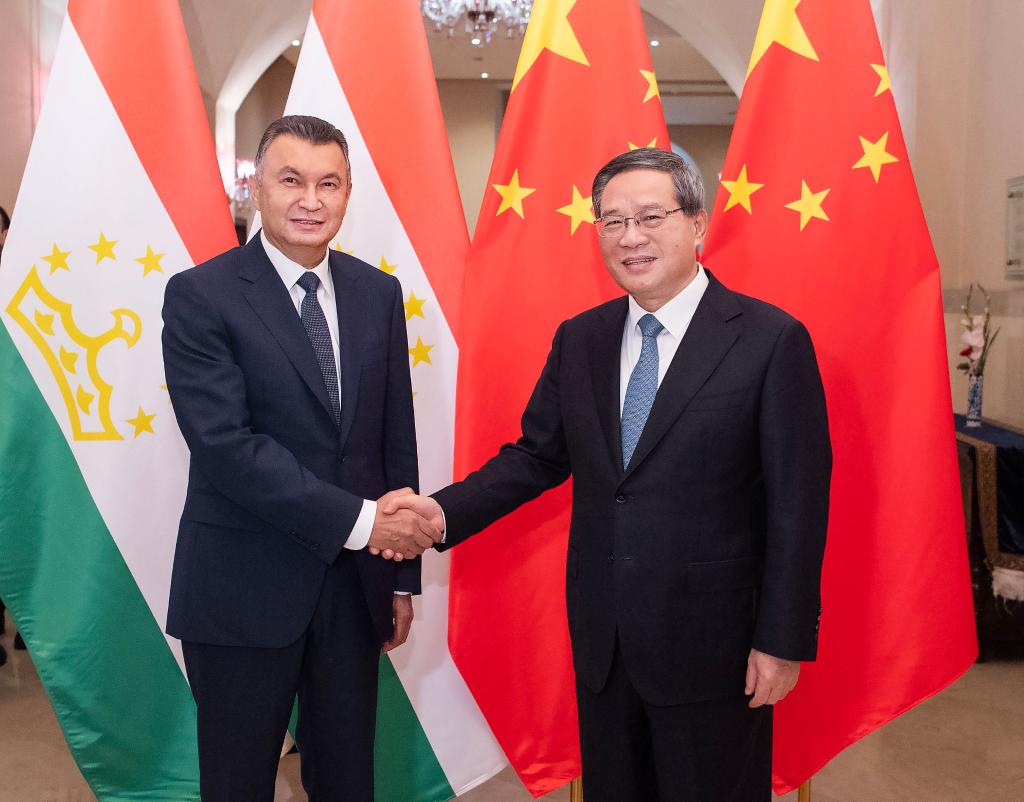
ISLAMABAD - Chinese Premier Li Qiang said here on Tuesday that China is ready to work with Tajikistan, focusing on the high-quality Belt and Road cooperation, to tap the potential of cooperation in various fields and expand cooperation in emerging industries in a bid to inject more impetus into common development.
Li made the remarks during his meeting with Tajik Prime Minister Kokhir Rasulzoda on the sidelines of the 23rd Meeting of the Council of Heads of Government of Member States of the Shanghai Cooperation Organization (SCO).
ALSO READ: Premier Li: China ready to work with Kyrgyzstan to consolidate mutual support
Li said that in July, President Xi Jinping paid a successful state visit to Tajikistan, during which the two heads of state jointly announced the decision to elevate China-Tajikistan relations to a comprehensive strategic cooperative partnership in the new era, and to build the China-Tajikistan community with a shared future at a higher level, drawing a new blueprint for the development of China-Tajikistan relations and cooperation.
China is ready to work with Tajikistan to further implement the important consensus reached by the two heads of state, carry forward traditional friendship, deepen mutual political trust, firmly support each other on core interests, lift China-Tajikistan all-round cooperation to a new level, and bring more benefits to the two peoples, he said.
READ MORE: Chinese premier meets Pakistani military leaders
China is going to work with Tajikistan to strengthen the synergy of development strategies. Guided by the vision of the China-Tajikistan community with a shared future and focusing on the high-quality Belt and Road cooperation, China stands ready to tap the potential of bilateral cooperation in various fields, advance cooperation in such fields as trade, investment, mining and agriculture, as well as in emerging industries including new energy and digital economy, promote connectivity, and strengthen people-to-people exchanges and cooperation in culture, education and tourism, in a bid to inject more impetus into common development, he said.

China will work with Tajikistan to implement the outcomes of the first China-Central Asia Summit, strengthen multilateral cooperation, jointly carry out the Global Development Initiative, the Global Security Initiative and the Global Civilization Initiative, advocate an equal and orderly multipolar world and a universally beneficial and inclusive economic globalization, practice true multilateralism, and uphold international fairness and justice, Li said.
Rasulzoda said that the traditional friendship between Tajikistan and China is profound, mutual political trust is solid, and bilateral relations are at the highest level in history.
READ MORE: Li: China to strengthen legislative exchanges, cooperation with Pakistan
Tajikistan congratulates the People's Republic of China on its remarkable development achievements since its founding 75 years ago, and thanks China for its long-term valuable support for Tajikistan's development, he said, noting that President Xi paid a successful state visit to Tajikistan not long ago, which strongly promoted the comprehensive strategic cooperative partnership between Tajikistan and China to a higher level.
Tajikistan is willing to work with China to fully implement the important consensus reached by the two heads of state of China and Tajikistan, strengthen exchanges at various levels, promote the Belt and Road cooperation, deepen cooperation in such fields as trade, investment, e-commerce, energy, industry, transportation and agriculture, expand cooperation in emerging fields like digital economy and green economy, and deepen cultural and people-to-people exchanges to better benefit the two peoples, he said.
Noting that Tajikistan supports the vision of building a community with a shared future for mankind and the three global initiatives proposed by President Xi, Rasulzoda said Tajikistan expects to work with China to promote cooperation between Central Asian countries and China, deepen cooperation within the framework of the United Nations and the SCO, and jointly uphold regional and global peace, stability and development.


